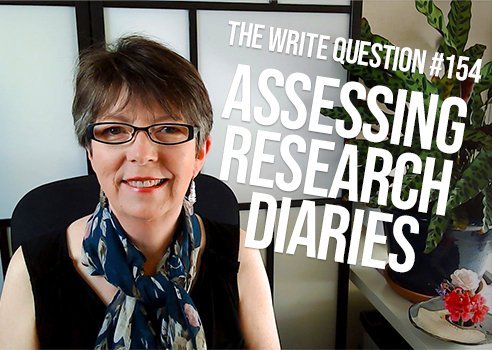Viewing time: 4 mins. 44 secs.
The Write Question is a weekly video podcast about writing that I started in 2017 and that ran, more or less weekly, until April 2022. This is a republication of issue #154, which addresses whether research diaries should be assessed by teachers. The post first ran on Sept. 11/20.
Transcript:
Should research diaries be assessed? That’s the topic I’m addressing today in The Write Question. I’m Daphne Gray-Grant, the Publication Coach, still in pandemic mode.
I have a question from Courtnay Zeitler, a librarian based at the University of the South in Sawanee, Tennessee. Here’s what she’s asked by email….
“I am designing a semester-long project for my college students that will take the form of a research diary, or journal. The class will range from freshmen to seniors, and all levels of research experience. I was wondering if you’d ever heard of a research journal being used as an assessment tool? I’m also curious to hear your opinion of that sort of assignment. I know you talk in your vlogs about how one’s journal is private, but it would allow me to see their development in becoming curious, critical thinkers.”
Thanks for your question, Courtnay. For newcomers to my Youtube channel, let me begin by explaining what a research diary actually is.
Paradoxically, it does not contain any research. Instead, it consists of the writer’s daily reflections about the research they have done. Here, I’m talking about thoughts. Opinions. Ideas. Feelings. All of the “mushy,” unscientific stuff. But it is stuff that will make the researchers’ work easier down the road, when it comes time for them to write their thesis, dissertation or paper.
The value of research diaries to twofold.
First, it forces academics to declare their opinions about what they’re reading rather than just collect facts. This is a vital step — particularly for people who tend to spend too much time researching. Academic writing requires more than facts. It also demands opinion and interpretation and context.
Second, the diary will keep academics writing — at a time when they might be inclined to avoid that necessary step. It’s always dangerous to let writing fall by the wayside because you get out of practice and it becomes even harder the more you delay. A research diary allows you to maintain your writing habit — even while you’re spending most of your time researching. And it does it in a low-risk way because no one else is going to see it.
I’ve written a blog post on research diaries and done a video as well. If the diary concept is new to you, see the links in the show notes, below.
Now, Courtnay, on to your question about whether a research diary should be used as an assessment tool…
My immediate reaction is no. Diaries are meant to be private and personal. If your supervisor asked to read your diary, would you not object? I bet you would!
If students know they’re being evaluated and graded on their research diary, it’s going to make them more self-conscious and nervous. And I think it would likely make them a bit resentful, as well.
And from a teaching point of view, I don’t see the merit in it either. Sure, you can argue that it would help you determine whether your students were becoming curious, critical thinkers.
But so would tape recording their conversations with friends. So would monitoring their email. But our society doesn’t do these types of things because we regard them as private. I think a research diary needs to fall into that category as well.
To me, the only thing we should be assessing is the finished work of your students. Assign them an essay and see how they do on that.
Finally, let me wrap up with a quote from the Irish poet William Butler Yeats: “Education is not the filling of a pail, but the lighting of a fire.”
Courtnay, I applaud your interest in helping your students become curious, critical thinkers. But I urge you not to turn research diaries into assessment tools. Instead, persuade your students of the benefits of research diaries and then step back, letting them do the work themselves, unimpeded and unevaluated. You will always catch more flies with honey rather than vinegar.
*
If you’d like to learn more about how to make writing a happier and more rewarding process, check out my latest book Your Happy First Draft. I don’t sell it in bookstores or via Amazon. The only place to buy it is on my website, link on the screen below and in the show notes.
Links
Why you should consider keeping a research diary


